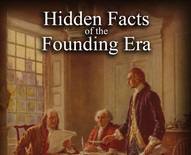|
I recently had the opportunity to listen to a debate between Mark Hall and Steven Green on the topic of the Christian foundation of America. Hall has written a book defending the idea that America had a Christian foundation, and Green has written a book in defense of the opposite view. I obviously agree with Hall, but I thought that he could have done a better job of refuting some of Green’s claims (and he probably does so in his book). Since I was taking notes anyway, I thought that I would share a few of my objections to Green’s claims.
0 Comments
 As I've shared my research on Franklin's faith with more and more people, one particular quotation has consistently been presented as evidence that Franklin never became a Christian. This quotation is taken from Franklin's Autobiography in which he made the following statement about George Whitefield: "He us’d indeed sometimes to pray for my Conversion, but never had the Satisfaction of believing that his Prayers were heard." Here is what I have written about this quote in my upcoming book Franklin on Faith:
 I recently received a request from a friend informing me that he was preparing for a public debate with a secularist on the topic of the Christian nature of the American Revolution. My friend wanted me to put together some suggestions to guide his study, so I quickly gathered up some of my notes and started jotting down a quick reply... Five pages later, I decided that I should probably stop before I completely overwhelmed him. I sent those five pages off to my friend a few days ago, and now I would like to share them here for the benefit of my readers. Here is the text of that letter:  Mr. Fortenberry has asked me to explain to his readers something of how I handle quotes as evidence. Contrary to popular belief (and to undergraduate education), the emphasis in graduate programs and in the process of earning a PhD degree is not on information transfer or indoctrination. The emphasis is on the proper methods for doing one’s own research. PhDs are expected to contribute to the academic world – to write the books used by others; so one is taught how to appropriately handle evidence and what counts as evidence. Contrary to what those who have never attended graduate school say, PhD students are not taught what to think, but how to properly treat competing and conflicting sources of information.  Contrary to popular opinion, Benjamin Franklin was a Christian who thought that the Bible was "the most faithful of all Histories." In fact, Franklin thought so highly of the Bible that he argued in the Constitutional Convention that "We should remember the character which the Scripture requires in rulers, that they should be men hating covetousness." In 1788, Franklin wrote a letter to the Federal Gazette in which he used the example of the government of ancient Israel to defend the newly written Constitution of the United States. Franklin makes several observations in this piece which serve as unquestionable evidence of the fact that he was a sincere Christian. Here is the text of Franklin's letter:  In recognition of the Fourth of July, I was invited to discuss the faith of our founders on the Deeper Waters podcast. The audio from the podcast is now available online, and I would like to invite all my readers to listen to it. It was a two hour broadcast, so we were able to cover a lot of topics. I've included a mostly accurate rundown of topics below if you want to jump to a few in particular. |
Bill Fortenberry is a Christian philosopher and historian in Birmingham, AL. Bill's work has been cited in several legal journals, and he has appeared as a guest on shows including The Dr. Gina Show, The Michael Hart Show, and Real Science Radio.
Contact Us if you would like to schedule Bill to speak to your church, group, or club. "Give instruction to a wise man, and he will be yet wiser: teach a just man, and he will increase in learning." (Proverbs 9:9)
Search
Topics
All
Archives
June 2024
|



 RSS Feed
RSS Feed